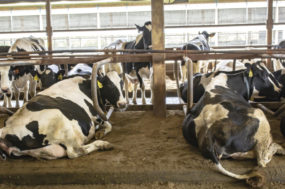Digest Highlights: Employee I-9 forms have been revised again. NAFTA renegotiation talks are scheduled. Expanded CRP haying and grazing allowed in Northern Plains. Dairy co-ops donate milk, money. Find a summary of these and other news here.
USCIS publishes revised I-9 Form
The changes are minor, but employers must begin using newly revised I-9 forms beginning in September.
The U.S. Citizenship and Immigration Services (USCIS) published a revised version of the I-9 Form in July. Use of the new form is optional until Sept. 17, but becomes mandatory on Sept. 18, 2017. The previous I-9 Form was updated last November.
Employers should continue following existing storage and retention rules for any previously completed Form I-9s.
The USCIS said it will revise the Handbook for Employers: Guidance for Completing Form I-9 (M-274) to make it easier for users to navigate. To learn more about the Form I-9, visit the USCIS website.
NAFTA negotiations to start Aug. 16; U.S. dairy objectives target Canada, geographic indicators
The first round of the North American Free Trade Agreement (NAFTA) renegotiations between the U.S., Canada and Mexico will take place in Washington, D.C. from Aug. 16-20. John Melle, assistant U.S. trade representative for the Western Hemisphere, will serve as chief U.S. negotiator.
U.S. Trade Representative Robert Lighthizer also released a summary of Trump administration negotiating objectives. The section on agriculture calls for maintaining existing reciprocal duty-free market access; expanding competitive market opportunities for U.S. agricultural goods by reducing or eliminating remaining tariffs and other nontariff barriers; and providing reasonable adjustment periods for U.S. import-sensitive agricultural products.
Dairy objectives, outlined by leaders of the National Milk Producers Federation (NMPF) and U.S. Dairy Export Council (USDEC) are more specific.
In testimony before a congressional hearing, Stan Ryan, president and CEO of Darigold, a Seattle-based dairy cooperative and USDEC member, said a renegotiated NAFTA must maintain market access to Mexico while also fixing trade challenges with Canada. In particular, U.S. negotiators must target Canada’s new Class 7 pricing strategy, which has negatively impacted the U.S. ability to export milk proteins, Ryan told members of the House Ways and Means Subcommittee on Trade.
Jim Mulhern, NMPF president and chief executive officer, said Canada’s import tariffs and pricing policies should be targets for negotiators. In addition, the negotiators must guard against allowing the use of geographic indications by the European Union in its bilateral trade agreements with both Canada and Mexico.
USDA expands emergency haying provisions on CRP land
The USDA opened additional Conservation Reserve Program (CRP) lands for emergency grazing and haying in and around portions of Montana, North Dakota and South Dakota, aiding livestock farmers affected by severe drought.
All emergency grazing must end Sept. 30, 2017, and emergency haying must end Aug. 31, 2017. Landowners interested in emergency haying or grazing of CRP acres should contact their local Farm Service Agency (FSA) office to obtain a modified conservation plan.
The area impacted has been designated “severe” or “D2” drought status or greater in the USDA’s weekly U.S. Drought Monitor. This includes counties with any part of their border located within 150 miles of authorized counties within the three states, and may extend into Idaho, Iowa, Nebraska, Minnesota and Wyoming.
As of July 18, USDA’s World Agricultural Outlook Board said about 15 percent of U.S. hay acreage was located in areas experiencing drought, up about 6 percent from a month earlier. States in the Northern Plains are hardest hit.
Michigan Milk Producers donate milk to food banks
More Michigan children will enjoy nourishing milk this summer thanks to 876,000 servings donated in June to the Food Bank Council of Michigan (FBCM).
The donation honored the 50th anniversary of Kroger and Michigan Dairy’s partnership with the Michigan Milk Producers Association (MMPA). On behalf of the state’s food banks, FBCM received a donation of 150 gallons of milk per day for 2017. This amounts to 54,750 gallons of milk to Michigan’s area food banks.
“One in seven people in Michigan struggle with hunger, and we’re constantly working toward solutions,” said Dr. Phillip Knight, FBCM executive director. “MMPA’s donation puts us one step closer to solving hunger and food insecurity in Michigan.”
Dairy Farmers of America raises glass, funds for Great American Milk Drive
Dairy Farmers of America (DFA) members and employees donated more than $24,000 to the Great American Milk Drive, which provides milk to local Feeding America food banks across the country. DFA’s donation will provide more than 4,800 gallons of milk to those in need.
The June Dairy Month fundraising efforts kicked off June 1 with World Milk Day, a worldwide recognition for the wholesome nutrition of nature’s most perfect food – milk. Across the country, DFA members and employees hosted World Milk Day events and were encouraged to raise a glass of milk to celebrate their passion and dedication to the industry. DFA pledged to donate one dollar to the Great American Milk Drive, up to $10,000, for every photo posted raising a glass of milk on social media. With this effort alone, DFA donated $10,000 to the Great American Milk Drive.
Additionally, in Kansas City where the cooperative is located, DFA sponsored a mobile milk bar serving a variety of hand-crafted, nonalcoholic flavored milk drinks. DFA’s mobile milk bar made stops at six different locations throughout the city, allowing local residents to enjoy flavored milk, cookies and take their own photos raising a glass. ![]()

-
Dave Natzke
- Editor
- Progressive Dairyman
- Email Dave Natzke





